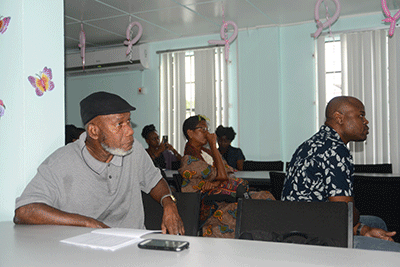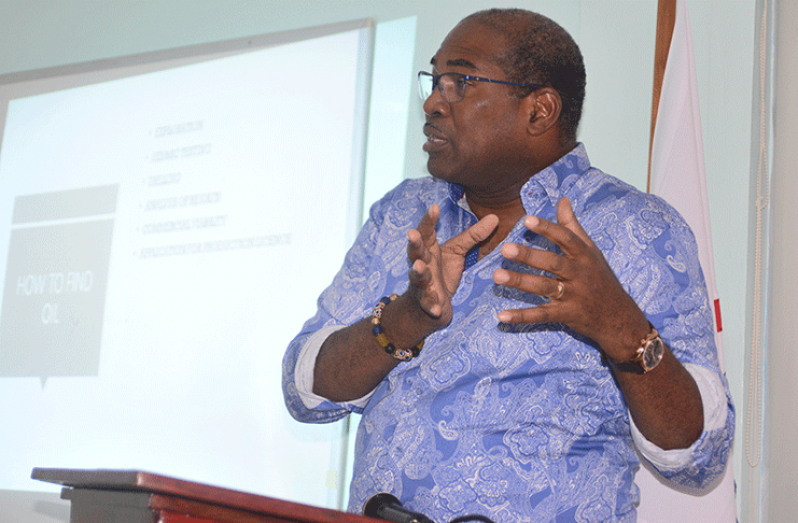WHILE many experts featured in the media are fixated on mandated forms of local content in Guyana, the country’s leaders should focus first on the training of workers to meet the percentage of local content it intends to bargain for.
This is according to prominent attorney Nigel Hughes, of law firm Hughes, Fields & Stoby. Hughes was addressing a gathering at an Oil and Gas Seminar on Sunday.
The event was hosted by Youth Challenge Guyana in collaboration with the Guyana Oil and Gas Association and the African Cultural and Development Association (ACDA) at the GuyOil Boardroom in Kitty, Georgetown.
“When you start to have a discussion about local content, it’s no point saying ‘we want 50 per cent of jobs to be given to Guyanese’ if you don’t have the Guyanese who are qualified in the area,” the told the audience.

“What we should be doing as a country is saying that for the next 25 to 30 years this oil is going to be extracted and therefore what are the various areas in which we can start training our people to be qualified, so that when we look at the rig, a substantial amount of those people are Guyanese.”
The policy framework is meant to outline the guidelines by which local content will be understood, developed, measured, secured and implemented in Guyana’s petroleum. It takes into consideration the urgent need for optimisation of revenues received from oil to benefit Guyana’s economy and citizens, present and future.
Local bodies such as the Georgetown Chamber of Commerce and Industry (GCCI) have submitted for inclusion in the final draft of Guyana’s Local Content Policy that it be mandated for all international companies operating locally to have 70 per cent of their workers be Guyanese.
However, Hughes explained that the oil and gas industry is so particular and so much is at stake, that one has to be well-qualified and certified before one can function efficiently in the field.
He stated that the difficulty would come if a law for a fixed percentage for local content law passed prior to training and citizens miss out either way, because they are underqualified and the country suffers as a result.
He advised: “You have to look at it in context. Are we qualified? Do we have a programme to become qualified and what’s the cost? How are we going to benefit and are we training people for the future industries?”
Another topic the attorney-at-law discussed was the 1986 Petroleum (Exploration and Production) Act which he lamented had not been updated in almost 40 years.
He also noted that greater changes in legislation and regulation could have occurred in 2019, but both sides of the political divide have been caught up with the no-confidence vote and the journey towards elections.
Hughes said that without the right regulations in place, Guyana would have not have any say over how quickly its oil is extracted. Additionally, it would be hindered from planning for strategic extraction based on changes around the world.
He underscored that the resource Guyana has is globally important and the country must be smart enough to know how to navigate itself in the international arena.
“We might have a different agenda to the oil companies. We might not want to take all the oil out now, because if we know that there are some oil prices coming up next year…[where] we may get a higher price, so we may want to stagger it so that we take the oil out at a time when it’s strategic,” he said.
“It is important that we get the framework right, up-to-date and not only up-to for today; we have to anticipate what [will happen] in the oil industries for the next 10 years.”
Hughes also told the gathering of the benefits which could come from the use of Liquid Natural Gas (LNG) in Guyana. He said, “We have found not only unbelievable amounts of oil, but we’ve found fantastic amounts of gas [also]…we, the people of Guyana, have to decide what we want to do with it.”
He encouraged that Guyana utilise its gas, convert it to LNG, which would significantly reduce the cost for electricity.
Hughes said that this also means that industrial estates in Guyana can benefit from these cheaper electricity prices when compared to other countries; this can attract investment and boost local manufacturing.
Positing that being ‘rich’ has little to do with the amount of money one has, but how one manages it, he touched on Guyana’s Sovereign Wealth Fund (SWF).
He also advised that Guyana establish institutions managed by non-political experts which transcend political cycles and develop a national infrastructural plan which is long-term (up to 20 years).
In fielding multiple questions from the audience on the topics, Hughes also advised the youths present that some of the areas in which they should direct their energies should they hope to benefit from oil, are finance, waste management, food supply and production and maritime transport.




.png)









